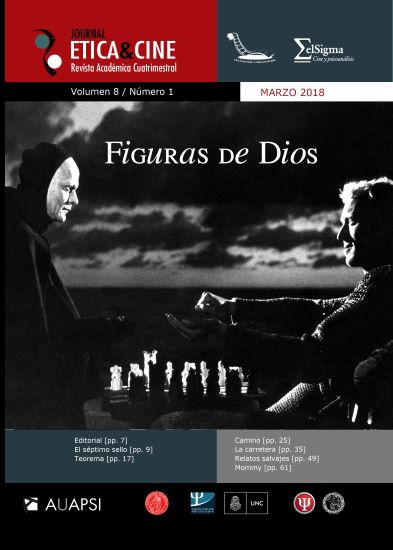Touring institutions: analysis of the film Camino
DOI:
https://doi.org/10.31056/2250.5415.v8.n1.19842Keywords:
Cinema study, Social Institutions, Bioethics, Gender stereotypesAbstract
If the cinema study became a powerfull toll to understand the social analysis, this lecture brings the intention to discuss aspects of the current society and the institutional influence. The relationships of the characters are strongly crossover by the natural knowledge of the conservative middle class family in Spain below influence of the catholic religion, specifically the Opus dei. From some topic´s of the Javier Fesser´s film, Camino, like life, health and ethics appear in tension whit theoretical constructions in gender and biopolitic. The mass media and the cinema usually shows exacerbated stereotypes of class and gender in the social net. The analysis we pretend to offer, represent a critical view of the institutional that it shows as given, the rules we passive assume as society, the stereotype roles we accept and the relation of politics and the strongest representative institution in Iberoamerica: family and religionDownloads
References
Agamben, G. (1996) La comunidad que viene, España: Pre-textos.
Agamben, G. (2003) Homo sacer. El poder soberano y la nuda vida. Valencia: Pre-Textos.
Agamben, G. (2004) Estado de excepción. Homo sacer II, Buenos Aires: Adriana Hidalgo.
Berrío, Ayder (2010) La exclusión-inclusiva de la nuda vida en el modelo biopolítico de Giorgio Agamben: algunas reflexiones acerca de los puntos de encuentro entre democracia y totalitarismo. Estudios Políticos, 36, 11-38.
Castro, E. (2006) Michel Foucault: Sujeto e historia. Tópicos. Santa Fe. 14, 171-183.
Fabbri, L. (2013) Apuntes sobre feminismos y construcción de poder popular. Argentina: Puño y letra.
Fausto-Sterling, A. (2000) Cuerpos sexuados: la política del género y la construcción de la sexualidad. España: Editorial Melusina.
Foucault, M. (1977) Historia de la sexualidad 1: La voluntad del saber. Argentina: Siglo XXI Editores.
Foucault, M. (1986) Historia de la sexualidad 2: El uso de los placeres. México: Ed. Siglo XXI.
Gila, J. y Guil, A. (1999) La mujer actual en los medios: estereotipos cinematográficos. En Comunicar: Revista científica iberoamericana de comunicación y educación, nº 12.
José maría Escrivá de Balaguer (2001). Camino. España: Ediciones Rialp.
Lerner, G. (1990) La creación del patriarcado. España: Editorial Crítica.
Millet, K. (1975) Política Sexual. México: Ed. Aguilar.
Paredes, D. F. (2007) El paradigma en la biopolítica de Giorgio Agamben. En Lopoldo Múnera (ed.). Normalidad y excepcionalidad en la política (Schmitt, Agamben, Žižek y Virno) (pp.109-124). Universidad Nacional de Colombia, Sede Bogotá: UNIJUS.
Pateman, C. (1995) El contrato sexual. Madrid: Ed. Anthropos.
Rubin, G. (1989) Reflexionando sobre el sexo: notas para una teoría radical de la sexualidad. En Vance, C. (comp.) Placer y peligro. Explorando la sexualidad femenina. España: Editorial Revolución.
Downloads
Published
How to Cite
Issue
Section
License
Los autores que publiquen en Ética y Cine Journal aceptan las siguientes condiciones:
Los autores/as conservan los derechos de autor © y permiten la publicación a Ética y Cine Journal, bajo licencia CC BY-SA / Reconocimiento - Reconocimiento-CompartirIgual 4.0 Internacional. La adopción de esta licencia permite copiar, redistribuir, comunicar públicamente la obra, reconociendo los créditos de la misma, y construir sobre el material publicado, debiendo otorgar el crédito apropiado a través de un enlace a la licencia e indicando si se realizaron cambios.

Este obra está bajo una licencia de Creative Commons Reconocimiento-CompartirIgual 4.0 Internacional.




